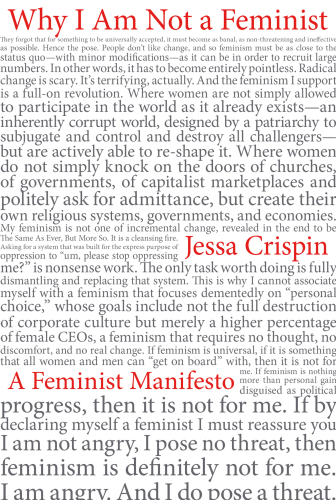
Why I Am Not a Feminist
A Feminist Manifesto
- اطلاعات
- نقد و بررسی
- دیدگاه کاربران
نقد و بررسی

October 24, 2016
Crispin’s (The Dead Ladies Project) slim polemic fits into the long tradition of advocates for women’s rights condemning the feminist politics of their historical moment for betraying the cause. Modern feminism, the author argues, has become a nonthreatening, commercialized, narcissistic lifestyle. In a series of nine brief chapters, she charges feminists with embracing a “universal feminism, devoid of any real personal internal change” or political action that benefits a privileged few. Many young feminists, she points out, have rejected the fiery radicalism of activists such as Andrea Dworkin, Shulamith Firestone, Germaine Greer, and Catharine MacKinnon in favor of more banal and self-interested versions of feminist philosophy and practice. They embrace victimhood and ideological purity, and are obsessed with individualized power rather than collective action for lasting, systemic change. Critique from within is vital to any movement, but Crispin’s analysis relies heavily on outdated stereotypes of young activists and “Internet feminism.” This work ignores or disparages the diversity of feminisms embraced by contemporary activists, including those under 30, women of color, trans and non-straight women, disabled feminists, and male allies; “disowning” a falsely singular and caricatured feminism is likely to alienate more readers than it will convert. Those seeking radical inspiration would do better to start elsewhere, perhaps with Alexandra Brodsky and Rachel Kauder Nalebuff’s 2015 anthology The Feminist Utopia Project.

Starred review from November 1, 2016
A taut and spirited attack on contemporary mainstream feminism.Despite the title, Crispin (The Dead Ladies Project, 2015), critic and founder of the pioneering literary website Bookslut, is indeed a feminist. She's a passionate defender of second-wave writers like Andrea Dworkin and Shulamith Firestone, and her chief complaint is that their critiques of capitalism and structural racism have been rejected in favor of weak-tea lifestyle feminism, where empowerment is making yourself attractive to men and activism is social media squabbling--and those second-wave radical feminists are lazily dismissed as men-haters. This transformation of feminism into "something soft and Disneyfied," Crispin argues, has produced a raft of lamentable and counterproductive consequences: it has alienated women who aspire to lives that don't demand climbing the corporate ladder, shamed women who speak about abortion in terms besides upbeat women's rights cheerleading, and excluded nonwhite, non-middle class women. What good is an uptick in women CEOs and politicians if they're just perpetuating the same divisions? ("Not a more egalitarian world, but the same world, just with more women in it.") What good is "self-empowerment" if it only translates into making oneself sexually available? Attacking the patriarchy, though, doesn't mean attacking men: "toxic femininity" is as pervasive as "toxic masculinity," writes Crispin, and she keenly balances a defense of men's role in supporting a more viable feminism without excusing male sexism. As with most manifestos, this one is better at laying out the problem--a "patriarchal, capitalistic, consumerist society"--than outlining solutions for it, and her case would be stronger if it addressed real-world divides as much as online ones. But the author's ferocious critique effectively reframes the terms of any serious discussion of feminism. You'll never trust a you-go-girl just-lean-in bromide again. Forget busting glass ceilings. Crispin has taken a wrecking ball to the whole structure.
COPYRIGHT(2016) Kirkus Reviews, ALL RIGHTS RESERVED.

November 1, 2016
With a title designed to entice and infuriate, this book provides an alternative to what Crispin (editor & founder, Bookslut) calls universal feminism and choice feminism. Crispin argues that a nonthreatening feminism is entirely pointless, maintaining that superficial feminism results in nothing. Anyone can "take up the [feminism] mantle, and terrible things are done in its name." Andi Zeisler's recent We Were Feminists Once offers a more compelling take on how feminism has migrated from action toward being a lifestyle or brand. With statements such as "despite our attempts at converting women to our values, we rarely seem to pause and ask ourselves if these things make us happy," Crispin detracts from the work feminists have done to take action against such acts as female genital mutilation, and she reduces women's achievements (e.g., calling Gloria Steinem "that banal, CIA-funded advocate for white, middle class women and almost no one else") in ways that aren't productive of meaningful change and instead have the tone of misogyny. VERDICT This manifesto potentially alienates without providing strategies that might help women to "stop thinking so small."--Emily Bowles, Appleton, WI
Copyright 2016 School Library Journal, LLC Used with permission.




دیدگاه کاربران